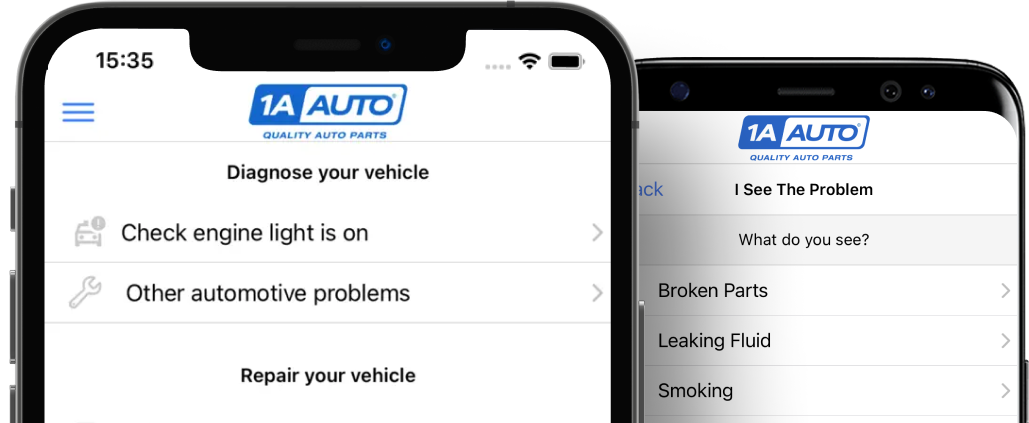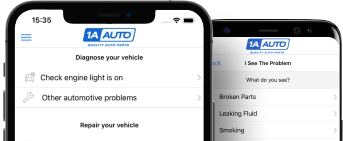Plymouth Parts
How the Plymouth Brand Began
In 1928 Chrysler became the third largest automotive manufacturer in the US. CEO Walter P. Chrysler called for further expansion into certain niche markets to gain a foothold against its larger competitors, Ford and GM. This lead to the purchase of the Dodge Brothers Company and the Fargo Truck Company, and the establishment of two new brands: DeSoto and Plymouth.
To create buzz for the new brand, the company's first car was showcased at the Madison Square Garden and was simply dubbed "Plymouth." When it was released, the Chrysler-Plymouth Model Q, which later dropped the "Chrysler" portion of the name in 1929, was priced a little higher than its Ford and GM counterparts, but luxurious detail, improved suspension, and advanced braking made it worth the money. It wasn't that much more expensive. After all, it was created to combat the lower-price competition.
So, the following year brought the Model U and an all-new brand named Plymouth. You might think the name Plymouth pertains to the rock in Massachusetts based on the company's Mayflower logo and advertising that related its models to the venturing Pilgrims, but it actually comes from the Plymouth Cordage Company's binder twine that was popular among farmers at the time. The company was hoping to share in the success of another brand that was already popular with one of their target markets. The Model U was similar to the Q, but with a slightly larger engine. It helped Plymouth play a significant role in the success of Chrysler during the Great Depression, a time when many other automakers had to close their doors, and the company became one of the top selling automobile brands in the country and the top selling brand for Chrysler.
Price cuts over time put the Model U in the same price range as Ford and Chevrolet. Still, it came with decent amenities for the price like a radio and an electric fuel gage. Chrysler, DeSoto, and Dodge dealers each sold Plymouths as well to keep afloat. The company even introduced the PA, a new model that Walter Chrysler revealed to Henry and Edsel Ford prior to its debut. The most impressive of this era were the PC, PD, and 1933 Plymouth DeLuxe Six. All were a big deal for releasing six-cylinder engines around 70 horsepower at a great price. Despite the Great Depression, Plymouth produced its millionth car in 1934. The Deluxe was capable of fitting to many different styles, making them popular for both private and commercial use. While many Deluxes ended up as family cars, others could be converted to ambulances and hearses. Sales continued to rise with shipments overseas to foreign countries like Sweden, Denmark, the UK, and Australia.
The Best Plymouth Models
In 1940 and 1941, Plymouth almost surpassed Ford as the second bestselling make in the country. Early models such as the Plymouth PA, Plymouth PC, Plymouth Cranbrook, Plymouth Suburban station wagon, Plymouth Concord, and the Plymouth Cambridge, along with the introduction of V8 engines and automatic transmissions into Plymouth automobiles during the 1950s, helped turn the brand into a well-respected, entry-level marque known for durability and affordability. Despite this, Plymouth did fall from the third best seller in the market, surpassed by Buick, but their credible reputation lasted through 1956, a year which also marked the release of the popular limited production Plymouth Fury line.
In 1957, a design theme entitled "Forward Look" was implemented on all Chrysler Corporation vehicles, including Plymouth, with the goal of revitalizing the companies' cars. Sales for Plymouth vehicles in 1957 rose to its highest levels ever. However, sloppy craftsmanship took away from the advanced, futuristic styling of the vehicles, and the incident gave Chrysler a longstanding reputation for poor quality that would haunt it for years to come.
The brand produced some successful cars after this mishap, demonstrating its popularity and staying power. 1960 saw the release of the Plymouth Valiant, and in 1964 the legendary Plymouth Barracuda was released. A series of muscle cars followed in the 1960s - the Plymouth Road Runner and the Plymouth GTX - and the Plymouth Duster was released in 1970. But the fortunes of the brand would once again turn, thanks in part to the fuel crisis of the mid-1970s. High retail fuel prices resulted in poor sales of its larger models, a sign of trouble for a brand that's stock in the marketplace began to decline.
An aged and dwindling lineup, bereft of unique vehicles, became a bigger problem for Plymouth, and hindered the brand for the remainder of its life. From the late 1970s onward, most Plymouth models, including the Volare, Colt, Sundance, Acclaim, Laser, Neon and Breeze, were simply versions of other Chrysler or imported Mitsubishi models. Plymouth's identity as Chrysler's entry-level brand had evaporated by the time the 1990s rolled around, and Plymouth was no longer a full-line make, offering only badge-engineered versions of Dodge and Eagle vehicles. Chrysler attempted to reposition Plymouth back to its traditional spot in the hierarchy with new marketing initiatives, like the introduction of a new logo, but consumers didn't bite.
The poor marketing also didn't help sales, which continued to fall. While the brand experienced some sales success during the ‘70s, ‘80s, and ‘90s with some of the aforementioned vehicles in addition to the subcompact Plymouth Horizon, the popular Plymouth Voyager and Grand Voyager minivans, and the Plymouth Prowler sports car released in 1997 (the last unique Plymouth model ever made), the brand still struggled and the Prowler's eventual demise foreboded Plymouth's extinction.
The total number of vehicles in Plymouth's lineup for much of the 1990s was limited, offering just three in 1995. By the end of the 1990s, its lineup consisted of only four vehicles: the Voyager/Grand Voyager minivans, the Breeze sedan, the Neon compact, and the Prowler sports car. After the Eagle brand was discontinued in 1998, Chrysler planned on reinvigorating the Plymouth division with new unique models in addition to the Plymouth Prowler with models like the PT Cruiser, but all that changed after the company's merger with Daimler-Benz AG that same year.
In late 1999, it was announced that the long neglected Plymouth brand would be discontinued at the end of 2001, with only a limited run of vehicles available that year. In anticipation of the discontinuation, the Plymouth Breeze was eliminated in 2000, and the PT Cruiser that was originally designed for Plymouth switched over to Chrysler and launched that same year. The Prowler, Voyager, and Grand Voyager were then absorbed into the Chrysler make as well.
In 2001, the Plymouth's final year of existence, only the Plymouth Neon remained in its lineup. The final Plymouth vehicle assembled was a silver-colored Neon in June of 2001, at which point, production of the Plymouth brand ceased. Following this, the Neon was absorbed into the Dodge make in U.S. markets and the Chrysler make in foreign markets, until production of the vehicle ended altogether in 2005.
Need Plymouth Parts?
While poor marketing and neglect from its parent company caused the demise of Plymouth, the entry-level marque that drivers loved for over 70 years, you can still find new and replacement parts for your Plymouth vehicle at 1A Auto. At 1A Auto, it is our mission to supply you with the right Plymouth parts you need to keep your vehicle working in tip top shape, at a great discount. You'll find a large selection of new, high quality aftermarket Plymouth auto parts, including headlights, taillights, weatherstripping, mirrors, door handles, exhaust manifolds, radiators, and more. We don't only just sell aftermarket Plymouth parts online here at 1A Auto; we also carry a selection of new, genuine OEM Mopar replacement parts - the very same parts you would receive if purchased from your local dealer, but without the inflated cost - and performance parts such as high flow air filters for your Plymouth as well.
Our product development team spends over 8,000 hours a year researching the best Plymouth auto parts, and they are carefully selected by our trained engineers so you can rest assured that you are getting the correct, high quality part you need for your car, at a discount price. If we wouldn't put the part in our own vehicles, we won't sell them to anyone else. A new aftermarket replacement Plymouth part from 1A Auto will save you 30-50% on average over a comparable new OEM replacement Plymouth part that you would get at a dealership, and our new aftermarket Plymouth parts are also extremely durable and reliable. Don't overpay for Plymouth parts and save yourself from a lot of potential headaches by shopping at 1A Auto.
You can shop for all of your Plymouth car parts online and buy safely and securely right here on our website, or you can call our customer service toll free at 888-844-3393 if you have any questions about any of our parts, or to buy over the phone. With over 150 years combined experience, 1A Auto's customer service representatives are the most qualified to answer your questions about all of our new, aftermarket, genuine OEM Mopar, and performance Plymouth car parts. Our representatives answer 99.9% of phone calls in less than one minute and emails are responded to within the hour because we know you need answers quickly to get your beloved Plymouth back in working order again. We also know you want your part fast for the same reason; 98% of in stock Plymouth auto parts ship from our warehouse within one business day so that you can get back on the road in no time, and all ground shipping in the continental US is completely free. And, in the unlikely case that you are unhappy with your Plymouth auto part for any reason, 1A Auto also offers the only No Hassle return policy for unused items in the industry. Simply put, our competitors can't beat the 1A Advantage. Don't just take it from us - take it from over 50,000 satisfied customers!
Look no further than 1A Auto for your aftermarket, original equipment (OE) Mopar replacement, new and performance Plymouth auto parts and get your vehicle the new parts it needs today from car enthusiasts just like you! If you happen to be an enthusiastic Plymouth owner, have a deep passion for Plymouth vehicles, or just want to learn more about the automotive manufacturer, continue reading below for a detailed look at the brand's history and some of its past models.

